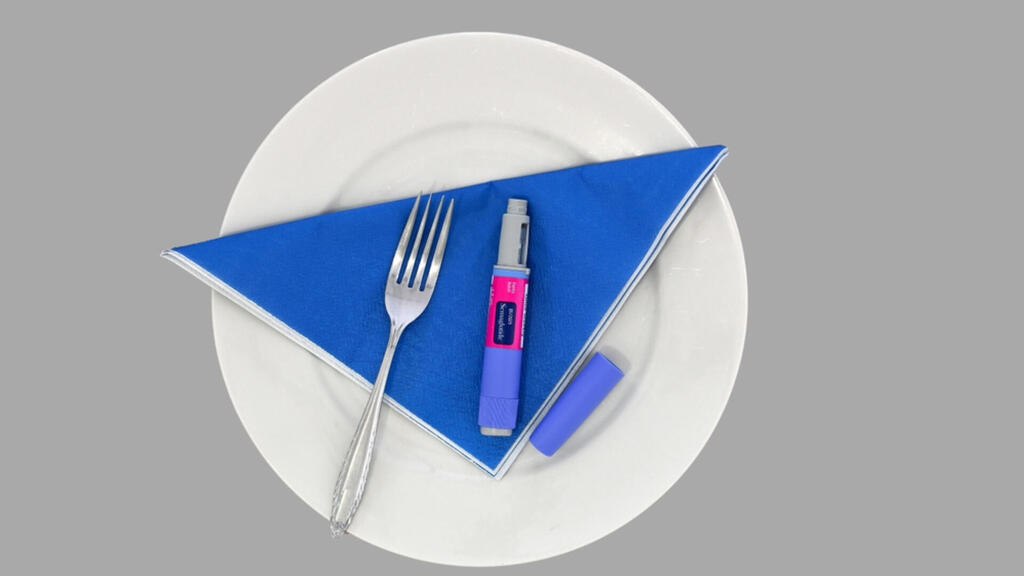It seems that suddenly Ozempic is everywhere. The component Semaglutide, which is included in it and helps with weight loss, has been discovered as a successful treatment for excess weight, and Hollywood and TikTok celebrities have turned it into a sensation. Within a few months, the drug has been branded as a "revolutionary" and a "game-changer," with the ability to change society's perceptions of obesity and weight loss. This is likely an accurate description of a drug like Semaglutide: never before in the history of medicine has a drug led to such a safe and dramatic weight loss in so many people.
Other Stories:
But let's not jump too quickly to conclusions. When it comes to weight loss drugs, Ozempic is far from perfect. Although the drug has clear results, it still requires weekly injections, is prone to uncomfortable side effects, and requires mental - not to mention financial - ability to sustain long-term treatment. Ozempic has somehow become the name commonly associated with the drug Semaglutide, but technically Semaglutide was only approved by the U.S. FDA as a drug for diabetes. A larger dose of Semaglutide, marketed under the name Wegovy, was approved as a weight loss drug.
Semaglutide, produced by the Danish pharmaceutical manufacturer Novo Nordisk, currently dominates the diet drug market in the United States, but we may be witnessing a short-lived reign. The enormous demand for drugs of this type has spurred the pharmaceutical industry to compete in developing better and more effective drugs, with the first of them potentially available as early as this summer.
Despite all the excitement surrounding it, semaglutide is just a milestone and not the way to the ultimate goal in a new category of weight loss drugs. What will determine the success of this pharmaceutical revolution is the extent to which the new drugs will be effective and quick-acting.
In a certain sense, semaglutide is far from being a major scientific breakthrough. Diet drugs are not new, and even the category of drugs to which these new products belong, called "GLP-1 agonists," has existed for several years. These are drugs that block the hormone GLP-1 (glucagon-like peptide-1), and bind to its receptor in the body to create a sense of fullness reminiscent of satiety after eating.
They also slow down the release of food from the stomach (and increase insulin secretion while maintaining blood sugar levels, which is why Ozempic is still intended as a treatment for diabetes).
These are drugs that have also improved over time: a daily injection called liraglutide, sold under the name Saxenda, which was approved by the FDA in 2014 for the treatment of obesity, led in most cases to a loss of 5 to 10 percent of body weight. But one of the reasons semaglutide has become much more popular than liraglutide is the fact that it leads to a weight loss of up to 20 percent. "Now there is a once-weekly injection, with a dramatic improvement, and people are hearing more about it," explains Angela Fitch, President of the Obesity Medicine Association and Medical Director of Knownwell, a nutrition company that deals with solutions for obesity.
But not everyone who takes the medication experiences dramatic weight loss results. Over 60% of patients on Victoza see smaller changes, partly because the medication can't act on the complex factors that contribute to obesity beyond food. The next generation of medications aims to achieve more. The first step up is Mounjaro, whose generic name is "tirzepatide".
This is a diabetes drug from the pharmaceutical giant Eli Lilly, expected to receive FDA approval as a weight loss drug later this year. In one study, it led to a 20% or more weight loss among 57% of those taking the highest dose. The Wall Street Journal recently called it the "King Kong" of weight loss drugs. People taking Mounjaro tend to lose weight more quickly and generally have a "better experience" than those taking Victoza, says Kit Tapper, a biotech analyst at BMO Capital Markets. It is also cheaper, although far from being inexpensive. According to Tapper, its cost ranges around $980 for the highest dose option, while a dose of Victoza costs about $1,350.
These efficiency leaps are made at the molecular level. Similar to semaglutide, liraglutide also blocks the effect of the hormone GLP-1, but it also acts on receptors for another hormone - GIP. The combination of the two leads to further weight loss by additional inhibition of food intake, and probably also due to increased activity of a fat-burning enzyme, explains Tauber. The drugs that display dual agonists "offer a step up", both in weight loss and in controlling blood sugar levels, he adds.
But why stop at two receptors when there are so many others involved in hunger signaling? "The field is advancing in terms of researching and testing different combinations of hormones," says Prof. Shona Levy, a leading bariatric surgeon at the Toulouse Medical School. Eli Lilly is currently working on another drug targeting three receptors, while another drug from Amgen has a mechanism of action that involves "hitting the brake pedal" on GIP receptors and "hitting the gas pedal" on GLP-1 receptors, according to a company spokesperson. Other companies have joined what some are calling the "race" to develop the next big weight loss drug, a race currently led by Eli Lilly, Pfizer, Amgen, Structure Therapeutics, and Viking Therapeutics.
The effectiveness of weight loss medications is not the only factor that will determine their future success. While most people can manage with injections of Victoza and Ozempic, injection is less convenient than swallowing a pill. However, producing an oral version of these medications is not as simple as just packing everything into a capsule. Semaglutide is a molecule that can be eaten in the gut. That's why the semaglutide pill, called Rybelsus and already approved for the treatment of diabetes, leads to a much less dramatic weight loss than its sisters, the injections.
But drug manufacturers are not deterred by the difficulty, because if a pill is better than semaglutide, there will undoubtedly be many customers. In January, Pfizer CEO Albert Bourla said that an oral weight loss drug would "release the market," which he estimates could reach $90 billion. Pfizer currently does not have a weight loss drug, but it is developing a twice-daily pill containing an agonist to GLP-1; Eli Lilly also has a version of the pill in development. Both companies expect their drugs to be available in 2026, with a similar proposal from Structure Therapeutics expected the following year.
Pharmaceutical manufacturers compete on developing drugs with fewer side effects. According to Novo Nordisk, the use of Semaglutide commonly causes digestive system problems as a side effect, and although reports of severe nausea, constipation, and vomiting flooded social media, as one player put it in the "New Yorker" magazine, people taking Ozempic "numb their brains." With Victoza, there is a greater risk of serious problems such as heart inflammation, thyroid cancer, or kidney failure, although these are rare complications. While they should not be underestimated, side effects tend to disappear over time and can generally be managed with the help of a doctor, according to both Pitz and Levi, who prescribe Semaglutide to their overweight patients. Levi notes that people who experience severe side effects may have obtained their medications from questionable pharmacies or bought them from other countries.
The fact that people turn to unreliable channels to obtain weight-loss drugs exposes the biggest problem with these drugs: accessibility. Medical insurance and most private insurance companies do not cover drugs for obesity (such drugs are classified as "cosmetic" by medical and insurance services and therefore are not eligible for coverage). "I hope that prices will drop as competition increases," says Pitz, but there is no guarantee that this will happen: competition usually makes a product cheaper over time, but studies show that this is not always the case with drugs. Even when drugs do become cheaper, they are still not cheap enough. According to Tapper, the pill version of these drugs, some of which will reach the market in 2026, is expected to cost around $500 per month. According to a recent analysis by Morgan Stanley, it is expected that by 2030, the cost of weight-loss drugs will drop to around $350 per month - still not within reach of many Americans.
Levy estimates that in the next five years, we will witness an "explosion" in drugs for weight loss among the next generation of women. In such a case, it is reasonable to assume that the market will expand to accommodate a range of drugs with differences in price and effectiveness. There will be people who want to lose 20 percent or more of their body weight, and there will be those who are willing to settle for less. The market will be so diverse that it is reasonable to assume that it will "support a wide range of options," says Tapper.
For example, there will be orally administered drugs that will be cheaper and in lower doses, suitable for people with moderate health problems, as opposed to expensive injections for those suffering from more serious health conditions. Such a situation opens up the possibility that weight loss through medical intervention will soon be accessible to a much larger segment of the population.
Even if the prices of medications go down, their cumulative cost will still be high for people who have to pay for them out of their own pockets. These are medications that are supposed to be taken over a long period of time, and when people stop taking them, the weight tends to come back. In fact, the current supply of weight maintenance medications is similar to a medication like "Lipitor" for cholesterol, which is taken daily and is intended to treat a chronic condition. But unlike weight loss medications, Lipitor is usually covered by insurance. If weight loss medications don't receive similar insurance coverage, no level of improvement in their effectiveness will result in their promise being fulfilled.





